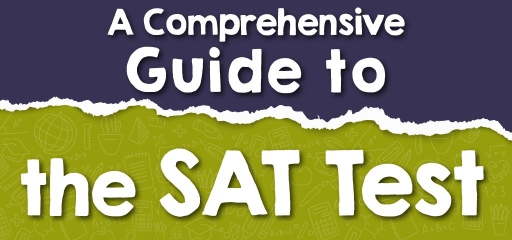
What Subjects Are Tested on the SAT? A Comprehensive Guide

Understanding the SAT: An Overview of the Test Structure
The SAT is a standardized college admission test that plays a critical role in the college application process for high school students in the United States. Understanding the structure of the SAT is essential for students preparing for this important examination. The test is divided into several sections, each designed to evaluate different skills and knowledge areas.
Test Components
The SAT consists of the following main sections:
- Evidence-Based Reading and Writing (EBRW): This section is further divided into Reading and Writing & Language tests, assessing a student's ability to interpret, analyze, and evaluate written material.
- Math: The Math section is split into two parts: one that allows the use of a calculator and another that does not. This section tests a range of mathematical concepts, including algebra, problem-solving, and data analysis.
- Essay (optional): While the essay portion is optional, some colleges may require it. This section evaluates a student's writing skills, particularly their ability to construct a coherent argument based on a provided text.
Scoring and Timing
Each section of the SAT is scored on a scale of 200 to 800, with a total score range of 400 to 1600. The test is timed, with students having a total of 3 hours to complete the EBRW and Math sections, plus an additional 50 minutes for the optional essay. This structured timing helps ensure that students can manage their time effectively during the exam.
Preparation Strategies
To excel on the SAT, students should familiarize themselves with the test format and practice with real test materials. Utilizing study guides, taking practice tests, and engaging in review sessions can significantly enhance a student's readiness. Additionally, understanding the types of questions that appear in each section can help students strategize their approach and improve their performance on test day.
Core Subjects Tested on the SAT: A Detailed Breakdown
The SAT is a standardized test widely used for college admissions in the United States, assessing a student's readiness for college-level work. Understanding the core subjects tested on the SAT is essential for effective preparation. The exam primarily evaluates skills in three main areas: Evidence-Based Reading and Writing, Math, and an optional Essay section.
Evidence-Based Reading and Writing
This section is divided into two parts: Reading and Writing & Language. The Reading portion focuses on comprehension and analysis of texts from a variety of genres, including literature, historical documents, social sciences, and natural sciences. Students are required to interpret data and make inferences based on the provided passages.
The Writing & Language section tests grammar, punctuation, and understanding of language use in context. Students must demonstrate their ability to revise and edit written passages, ensuring clarity and coherence. This section emphasizes the importance of effective communication and critical thinking skills.
Mathematics
The Math section of the SAT is divided into two parts: one that allows the use of a calculator and one that does not. The questions assess a range of mathematical concepts, including:
- Algebra: Solving equations, understanding functions, and working with ratios and proportions.
- Problem Solving and Data Analysis: Interpreting data from tables and graphs, and applying mathematical reasoning to real-world scenarios.
- Advanced Math: Concepts such as quadratic equations, complex numbers, and trigonometry.
Students must demonstrate proficiency in both fundamental and advanced mathematical skills, showcasing their ability to solve problems in various contexts.
Optional Essay Section
While the Essay section is optional, it provides students the opportunity to showcase their writing skills and analytical abilities. In this section, students are asked to read a passage and analyze how the author builds an argument, focusing on elements such as evidence, reasoning, and stylistic choices. This component emphasizes critical thinking and effective written communication, skills that are highly valued in college and beyond.
Math on the SAT: Key Topics You Need to Know
The SAT Math section is designed to assess a student’s mathematical skills and understanding, covering a wide range of topics. To excel in this section, it’s crucial to familiarize yourself with the key areas that the exam emphasizes. The Math section is divided into two parts: one that allows the use of a calculator and one that does not. Below are the fundamental topics you should focus on:
1. Heart of Algebra
The "Heart of Algebra" category encompasses linear equations, inequalities, and functions. Key skills include:
- Solving linear equations and inequalities in one variable
- Interpreting and constructing linear functions
- Understanding slope and intercepts
Mastering these concepts is essential, as they form the basis for more complex mathematical reasoning and problem-solving.
2. Problem Solving and Data Analysis
This section emphasizes the application of mathematics to real-world scenarios, focusing on ratios, percentages, and data interpretation. Important elements include:
- Analyzing and interpreting data from tables and graphs
- Understanding statistical measures, such as mean, median, and mode
- Solving problems involving proportional relationships
Being proficient in these areas will not only help you on the SAT but also in everyday decision-making and analysis.
3. Passport to Advanced Math
"Passport to Advanced Math" dives deeper into complex equations and functions, requiring a higher level of mathematical understanding. Key topics include:
- Manipulating polynomial expressions
- Working with quadratic equations and functions
- Understanding exponential functions and their properties
This area is vital for students aiming to pursue advanced mathematics in college, as it lays the groundwork for calculus and beyond.
Familiarizing yourself with these key topics will significantly enhance your performance on the SAT Math section. Regular practice and application of these concepts will not only prepare you for the exam but also strengthen your overall mathematical skills.
Reading and Writing: What to Expect on the SAT
The SAT's Reading and Writing sections are designed to assess your comprehension and analytical skills, as well as your ability to communicate effectively through writing. Understanding the structure and content of these sections is crucial for achieving a competitive score. The Reading section consists of multiple passages that cover a range of topics, including literature, historical documents, social sciences, and natural sciences. Each passage is followed by a series of questions that test your ability to interpret, analyze, and draw conclusions from the text.
Key Components of the Reading Section
- Passage Types: The reading section includes a variety of passage types, such as narrative, argumentative, and informative texts. Familiarizing yourself with these different styles can help you anticipate the types of questions that may arise.
- Question Formats: Questions may ask you to identify the main idea, analyze the author's purpose, or interpret specific details. Some questions may also require you to make inferences or understand the context in which a statement is made.
- Time Management: You will have 65 minutes to complete the Reading section, which means pacing yourself is essential. Practice with timed readings to improve your speed and comprehension.
The Writing and Language section focuses on grammar, punctuation, and effective language use. You will encounter a series of passages that contain errors or areas for improvement, and your task is to identify and correct these mistakes. This section evaluates your ability to revise and edit written material for clarity, coherence, and overall effectiveness.
Important Aspects of the Writing and Language Section
- Grammar and Usage: Questions will cover topics such as verb tense consistency, subject-verb agreement, and pronoun usage. A solid understanding of English grammar rules is vital for success in this section.
- Rhetorical Skills: In addition to grammar, you will also be tested on your ability to improve the overall quality of the writing. This includes assessing the effectiveness of word choice, sentence structure, and the organization of ideas.
- Time Allocation: You will have 35 minutes to complete the Writing and Language section. Practicing with sample questions can help you develop the skills needed to identify errors quickly and accurately.
By familiarizing yourself with the format and expectations of the SAT Reading and Writing sections, you can enhance your preparation and increase your confidence on test day.
Preparing for the SAT: Resources for Each Subject Area
When it comes to preparing for the SAT, utilizing the right resources for each subject area is crucial for maximizing your score. The SAT is divided into three main sections: Evidence-Based Reading and Writing (which includes Reading and Writing & Language), Math, and the optional Essay. Each subject area has specific resources that cater to its unique requirements, helping students to develop the necessary skills and strategies.
Reading Resources
For the Evidence-Based Reading section, students can benefit from a variety of materials that enhance comprehension and analytical skills. Consider using:
- Official SAT Practice Tests: These provide real SAT questions and passages to familiarize yourself with the format.
- Reading Comprehension Workbooks: These often include exercises and strategies for tackling complex texts.
- Online Platforms: Websites like Khan Academy offer personalized practice tailored to your strengths and weaknesses.
Writing & Language Resources
The Writing & Language section tests grammar, punctuation, and effective language use. To prepare effectively, you can explore:
- Grammar Guides: Comprehensive books that cover common grammar rules and writing conventions.
- Online Quizzes: Websites that provide practice questions focused on grammar and sentence structure.
- Peer Review Groups: Engaging with others to review and critique writing can enhance your skills and understanding.
Math Resources
For the Math section, it's essential to grasp both the content and the problem-solving techniques. Useful resources include:
- Math Review Books: These books typically cover all topics tested on the SAT, including algebra, geometry, and data analysis.
- Online Video Tutorials: Platforms like YouTube feature educators who break down complex math concepts.
- Practice Problem Sets: Regular practice with problems from official SAT materials can help reinforce your skills and build confidence.
By strategically selecting resources tailored to each subject area, students can effectively enhance their SAT preparation, leading to improved performance on test day.
Did you find this article helpful? What Subjects Are Tested on the SAT? A Comprehensive Guide See more here General.
Leave a Reply





Related posts